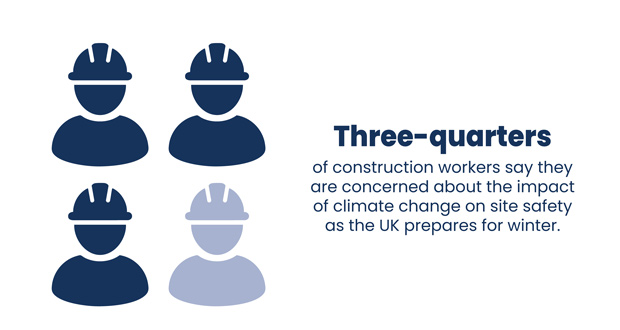As the UK prepares for winter, a new survey commissioned by SafeSite Facilities has found that three-quarters of construction workers say they are concerned about the impact of climate change on site safety.
The survey revealed a worrying picture of increasing hazards on site due to climate change events and rising concerns over whether the industry is prepared.
Those fears will come into focus over the coming months as the UK prepares for storm season, having seen five major storms in the winter of 2024-25. Storm Eowyn in January 2025 was the most powerful windstorm in the UK for more than a decade, bringing red warnings, severe impacts and a number of fatalities. It saw gusts of up to 92 miles an hour, with a million homes without power at the peak of the storm.
The survey, conducted by Censuswide across August and September 2025, reached 500 UK construction professionals aged 18-55.
Key findings of the survey revealed:
- 75 per cent of those working in construction are worried about the impact of climate change on site safety over the next five years.
- 54 per cent said sites have been closed down at least two times over the last five years because of climate change events.
- 25 per cent say their site is unprepared for extreme heat, lightning or flooding.
- 22 per cent say their site is unprepared for storms and 17 per cent for high winds. The figure for wildfires is even higher at 30 per cent.
- 37 per cent have already experienced the impact of extreme heat (rising to 43 per cent in commercial construction).
- 34 per cent have already experienced flooding (rising to 38 per cent in residential construction)
- 33 per cent have already experienced high winds.
Paul Goossens, Operations Director at SafeSite Facilities, said: “As winter approaches the implication for construction sites of further major storms is obvious, with many workers feeling their sites are unprepared. With rising temperatures in summer there are now major threats across all seasons.
“It’s clear concern about the impact of climate change is running high across the construction industry with many having experienced the effects of climate change on site already.
“Construction sites managers need to start thinking seriously about preparing for winter, especially when it comes to health and safety.
“It’s likely we will need to deal with multiple storms hitting 50 to 100 miles per hour and the risks on site will multiply fast. Every site should have a clear winter safety strategy in place which plans for an uptick in extreme weather.”
The impact of climate on site safety also came through clearly in the survey, with workers saying they have already suffered from injuries due to:
- Heat stress and heatstroke: 25 per cent (up to 31 per cent for construction labourers)
- Slips and falls due to ice, snow or flooding: 25 per cent (up to 28 per cent for construction labourers)
- High winds destabilising scaffolding, cranes, temporary structures: 23 per cent (up to 26 per cent for construction labourers and project managers)
- Electrical hazards: 23 per cent (rising to 34 per cent for site supervisor)
- Feeling too cold to work: 21 per cent (rising to 23 per cent for project managers)
- Sunburn: 21 per cent (up to 34 per cent for safety officers)
- Frostbite: 15 per cent (rising to 26 per cent for construction labourers)
- Lack of focus: 14 per cent (up to 20 per cent for safety officers).
Dr Lowellyne James, HSEQ Manager at Safesite Facilities, added: “As climate change intensifies construction businesses must recognise the growing impact on site safety and workforce wellbeing.
“Rising temperatures, extreme weather and climate-related anxieties will continue to contribute to increased absenteeism and mental health strain.
“To mitigate these risks, companies should consider implementing resilience and mental health training, establishing structured communication platforms for worker concerns and aligning wellbeing strategies.
“Prioritising psychological safety alongside physical protections helps build a more resilient workforce and ensures operations are better prepared for future climate challenges.”
The way we work has changed – yet, many organisations are still relying on rigid, one-size-fits-all tools to manage desks and meeting rooms, according to a new study from workplace management solutions provider, Matrix Booking.
Spreadsheets, calendars, and generic booking software may have worked once, but they’re struggling to keep pace with today’s flexible, hybrid workforce. The result? Wasted time, frustrated employees, and expensive underutilised space.
Matrix Booking’s new study, ‘One-size-fits-all booking systems don’t work for today’s workforce’, explores why current systems are falling short – and how organisations can reimagine workspace management to boost efficiency, employee experience, and cost savings.
To download your FREE copy click here.





